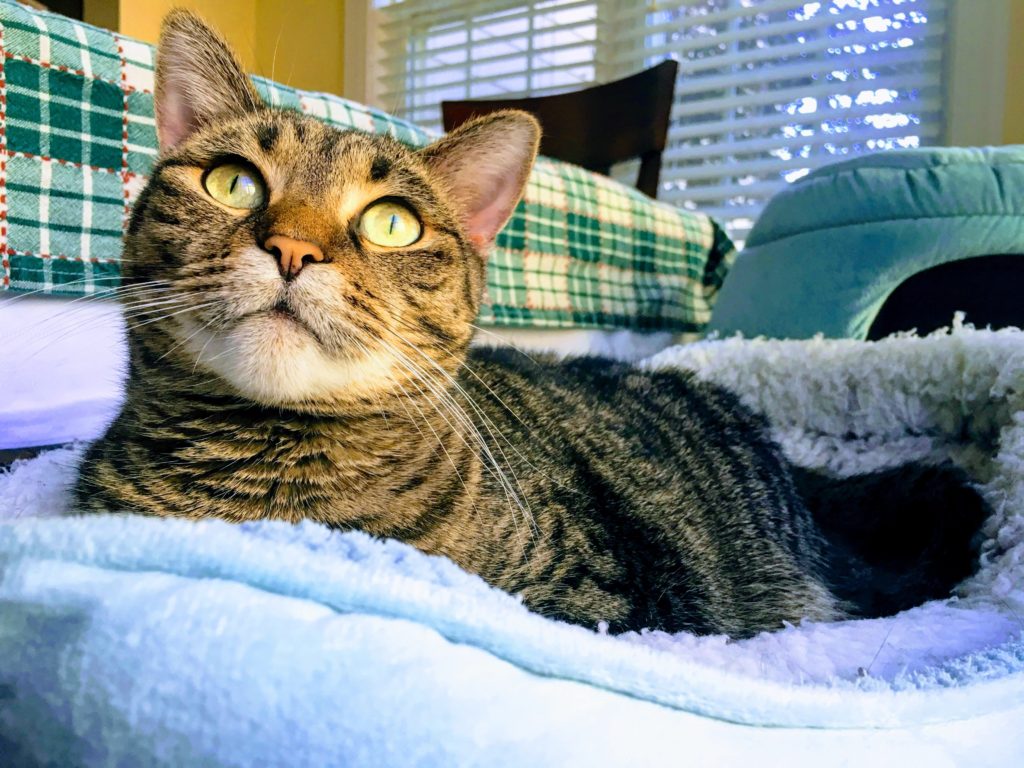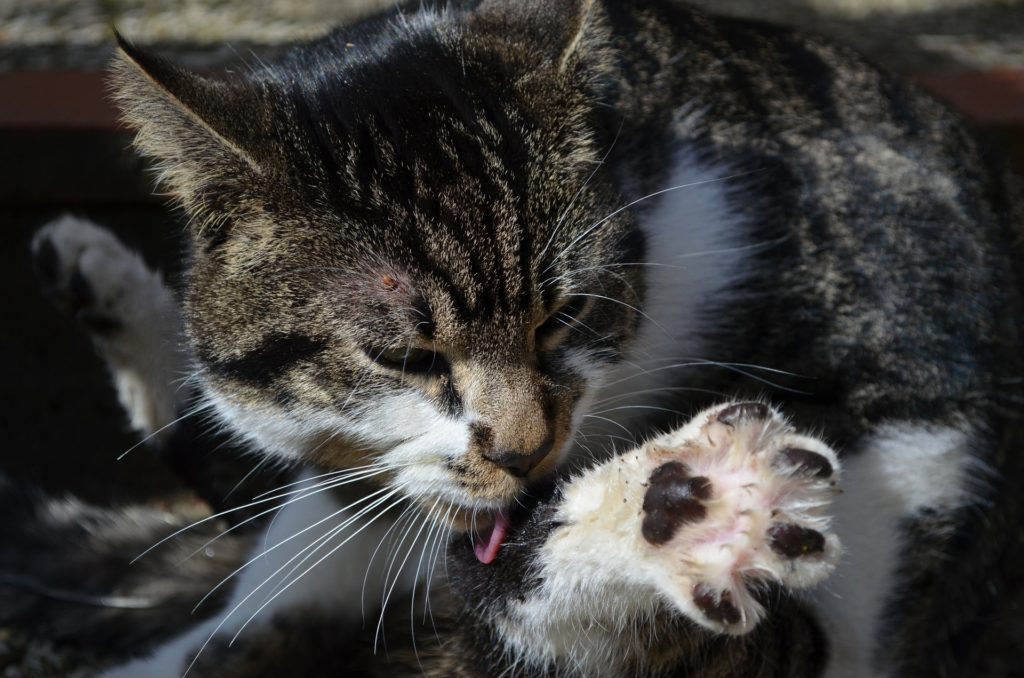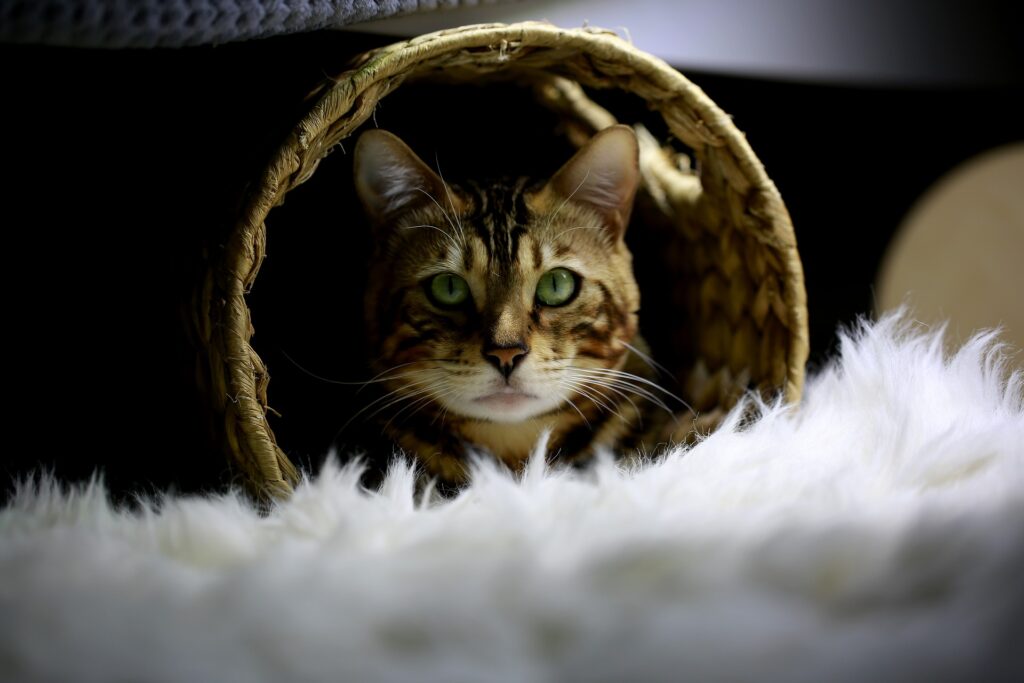Your cat has wet itself due to an illness such as cystitis, incontinence or uncleanliness.
Cats wetting themselves can also be caused by incontinence. This is when your cat loses small drops of urine unnoticed or even leaves behind a whole puddle. However, incontinence is not that common.
As a rule, it is more a case of your cat being unclean. This means she urinates in places around the litter tray or on other objects. This is usually due to a bladder infection or a urinary stone. You should seek veterinary advice if your cat urinates frequently.
With incontinence, cats often have pain when urinating and meow very loudly, as well as leaving small amounts of urine in unusual places.
Cats suffering from incontinence often pass a few drops of urine. This can be in the kitchen, for example, or just completely unexpectedly when petting.
The cats meow very loudly when they urinate because they are in a lot of pain. You should seek veterinary advice.
Also pay attention to your cat’s urine. If the urine is mixed with blood, it indicates incontinence.
Frequent licking of the genitals can also be a symptom of incontinence in your cat.
Why does my cat urinate in bed?
Cats often urinate in bed because they retreat there when they have an illness such as cystitis or incontinence.
Many cats retreat when they are not feeling well. For many, the only place to go is their owner’s bed, which smells very familiar and safe. All the more often it can happen that your cat urinates in the bed. This can have the following causes:
- Your cat has kidney problems or a bladder disease
- Incontinence due to an accident or old age
- Increased fluid intake on very hot days
Cats often wet themselves in bed when they are ill, as this is where they feel most comfortable and can retreat.

What to do when cat pees in protest?
If your cat protests, change the litter tray or move the litter tray to a quieter place.
There are several possible solutions if your cat pees in protest outside the litter tray. First, you could try a different litter box. Cats are very sensitive animals when it comes to litter.
You could also make it easier for an older cat to get into the litter tray by lowering it.
Also, the litter tray should be in a very quiet place and not near the food bowl or other public places.
Another solution to your cat’s protest peeing would be to counteract it with rustling foil in the places where your cat always leaves its urine, or to place the litter tray in that spot.
What happens when I wash my cat?
Cats are very water-shy animals and it is essential that they are well restrained when cleaning. Washing should be done quickly and quickly.
Many cats loathe water and do not like to be washed. That’s why a splash from a water gun is a good way to chase cats away from the dining table or the new sofa.
Before washing your cat, you should prepare certain things very well so that the actual cleaning can be done quickly and efficiently. Washing and cleaning is very stressful for the cat.
You should do the following before washing your cat:
- It is best to lay out non-slip mats in the bathroom so that your cat cannot slip and injure itself if it tries to escape.
- It is also advisable to trim your cat’s claws beforehand so that it cannot injure you too badly. If you have ever felt a claw on your hand, you know exactly how painful it can be.
- Prepare two small bowls of warm water to wash your cat with later.
- Prepare everything in the bathroom and place the cat shampoo and a towel close to you.

Here we explain what you should consider when washing your cat:
- Carefully lift your cat into the water and have a helper hold it firmly while you clean your cat with the lukewarm water.
- Be careful not to lather the head area with shampoo and do not pour the water over the head. It is best to wash the back of the neck first and then move down to the legs.
- Talk to your cat in a gentle and reassuring voice while washing to give him reassurance.
- At the end, dry your cat with two towels and prepare a warm place for your cat by the stove or heater.
Down below we have summarized our most popular posts for you in a great overview:
- Why do cats groom themselves after eating?
- Cat does not like treats
- How do cats cool off in the summer?
- How to keep ants out of the cat food
- Cat only wants to eat
- Do cats like it warm or cold?
- Is there food envy in cats
- How do cats cool off in the summer?
- How long does open wet cat food keep?
- Strange cat comes again and again
Summary – Cat has wet itself
Your cat has wet himself because of an illness such as cystitis, incontinence or uncleanliness.
With incontinence, cats often have pain when urinating and meow very loudly, as well as leaving small amounts of urine in unusual places.
Cats often urinate in bed because they retreat there when they have an illness such as cystitis or incontinence.
Cats are very water-shy animals and it is essential that they are well restrained when cleaning. Washing should be done quickly and quickly. It is best to equip the bathroom with non-slip mats and have shampoo and towels within easy reach. Your cat’s head should not be lathered and should be cleaned very carefully.

